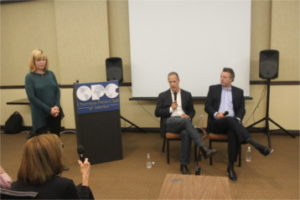Event Coverage Highlight

Junger and Quested Probe Conflict in Syria for ‘Hell on Earth’
 On Wednesday, May 24, the OPC hosted a special screening and discussion of the documentary Hell On Earth: The Fall Of Syria And The Rise of ISIS, with filmmakers Sebastian Junger and Nick Quested.
On Wednesday, May 24, the OPC hosted a special screening and discussion of the documentary Hell On Earth: The Fall Of Syria And The Rise of ISIS, with filmmakers Sebastian Junger and Nick Quested.
The film puts the atrocities of this brutal paramilitary group in historical context, tracing the roots of ISIS to the rebel movement against Bashar al-Assad in Syria as well as U.S. mishandling of the aftermath of the Iraq War.
Hell On Earth was cut from 1,000 hours of footage that includes that of a family living under ISIS control that finally fled to Turkey.
Junger said to get footage of the family, they sent them cameras and gave them loose technical instructions.
“We were very clear with them: self-document, but only make decisions that you yourselves are making for your own welfare. And eventually they decided to flee ISIS territory, which was a very risky thing to do,” he said. “We were incredibly lucky because not only did they get through safely but these two guys who had never shot video and their lives shot some of the most moving profound footage of the entire film.”
The film also follows Kurdish fighters in Sinjar and Shia militias in Iraq as well as al-Qaida-affiliated fighters in and around Aleppo and Raqqa.
Since there was little chance of safely “embedding” with ISIS, the filmmakers drew from ISIS propaganda films to represent their strategies and recruitment. Images of patriotic songs and violent rhetoric were juxtaposed against nationalistic images of other countries, such as the US and France.
“Every society is sort of blind to its own violence, really,” Junger explained. “And people are particularly irrational in how they evaluate violence. [Bashar Al-Assad] has killed far more people than ISIS, but ISIS because of the public nature of the violence are sort of known as the bad guys. And they’re terrible people you know I’m not defending them. But what we forget in America, or the news consumer forgets is that Assad is roughly eight times as bad if you just judge by the amount of people killed.”
Junger talked about the responsibility of nations to protect refugees fleeing conflict.
The filmmakers also talked about Western fighters who have joined ISIS, and what their fate might be if the organization was successfully put down.
Asked what the filmmakers would hope President Donald Trump might glean from the film if he watched it, Quested said he would like to impart a sense of compassion for those who are fleeing violence.
“They were forced to flee because of the intense bombing by the Russians and Assad, and then by the very nature of living under the Islamic State. That’s really the primary take away. If he could understand that if New York was attacked now, we’d be facing all kinds of the same choices.”
One audience member who was preparing to go to the Middle East to work for an aid organization asked if Junger thought the role of journalists might be changing.
“The role of doctors is to cure illness, to help people to alleviate suffering. And the role of journalism is to bring the truth out. End of sentence. And I don’t think that will change,” he said.
Hell on Earth debuted at the Tribeca Film Festival in April and aired on National Geographic, which produced the film.
Junger and Quested previously collaborated on a trio of films about the war in Afghanistan: Restrepo, The Last Patrol and Which Way is the Front Line From Here.


